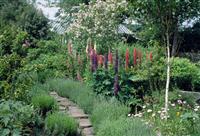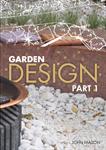Plant Selection; choose the right plants for the landscape
 Good plant selection is critical to the success of any planting design. There are two main areas of plant selection. These are firstly, choosing the right plant species or cultivar for your requirements, and secondly, ensuring that once you have decided which plants you want to grow, that you choose healthy, good quality specimens of those plants.
Good plant selection is critical to the success of any planting design. There are two main areas of plant selection. These are firstly, choosing the right plant species or cultivar for your requirements, and secondly, ensuring that once you have decided which plants you want to grow, that you choose healthy, good quality specimens of those plants.
PLANT SELECTION CRITERIA
When you decide to use a plant in a garden, you should consider the following:
Pre-planning Considerations
This includes the site characteristics, such as slope and soil type, as well as the location of services and buildings, local by-laws and the owners preferences (e.g. theme, colours).
Use
What particular task or tasks do you want the plant to fulfil. Shade, appearance, windbreak, hedge, screen, feature?
Climate Considerations
Which plants are best suited to the particular climatic conditions in your area. Bear in mind factors such as rainfall, temperature (maximum and minimums in particular), humidity and bushfires. Also consider microclimates that might exist or be created as the garden is constructed. Some isolated areas within tropical zones (such as mountain tops) may be subject to frost and snow.
Growth Characteristics
How big does the plant grow and how quickly, both in height and width; what shape does it form (upright, weeping, round, etc.); does it have invasive roots that are likely to lift footpaths or buildings or block drains; is it deciduous so that it provides shade in summer and allows light through in winter. Is the plant a potential weed, becoming invasive through such means as suckering, self layering, self seeding, etc. Is the plant fragrant, or perhaps has an offensive odour?
Longevity
How long is the plant likely to grow. Some trees may live for hundreds of years (e.g. Eucalypts, Figs), others only for 5 or 20 years (e.g. Acacias). Slow growing trees may take considerable time to provide protective shade for understorey plants. Quick growing trees may provide quick protection for other plants, but leave them exposed when they later die. In many cases short-lived protection may be an advantage, allowing less hardy plants to become well established before their protective cover dies out.
Safety
Do the plants have thorns or prickles that may cause injuries; can it cause an allergic reaction; are parts of it poisonous; is it likely to drop branches; is it likely to burn easily? Such considerations are particularly important if the garden is likely to be exposed to children - the owners own, their visiting grandchildren. etc.
Maintenance
Does the plant require pruning, staking, regular feeding? Does it drop leaves or fruit that may need to be swept or raked, or even removed form the tree for safety reasons (eg. Cannonball tree (Couroupita guianensis)).
Hardiness
Is it prone to attack from pests and diseases; is it readily affected by pollutants. Can it withstand harsh conditions, such as salty, coastal breezes, cyclonic winds, or hot, dry, summer winds?
Availability & Cost
Are the plants you are considering for your design, readily available? What do they cost? Are substitutes available?
Want to Learn More?
BOOKS
The following ebooks are just some of those written by our principal (John Mason) and staff, and are available through the school's online bookstore. Click on a book for details
|

What to Plant Where
|

Herbs
|
 Garden Design Part 1 Garden Design Part 1
|

Garden Design Part 2
|
 Tropical Landscaping Tropical Landscaping
|

Roses
|
COURSES
For more information on Courses on Landscaping, Horticulture and Plants:
In Australia: http://www.acs.edu.au/Courses/horti.aspx
In the UK: http://www.acsedu.co.uk/Courses/horti.aspx
You may also be interested in....